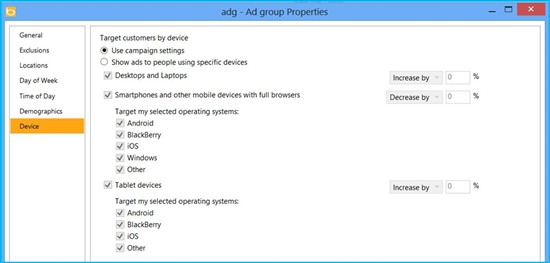Bing Ads Launches Google Enhanced Campaigns Compatibility Update, Tablet Targeting Stays, Still
Today Bing Ads launched the updates the company announced in June to make the platform more compatible with the changes Google ushered in with enhanced campaigns. The updates were implemented to support uploading of now-enhanced AdWords campaigns into the Bing Ads platform. Device preferences on ads, the new ValueTrack parameters that allow advertisers to point […]

The updates were implemented to support uploading of now-enhanced AdWords campaigns into the Bing Ads platform.
Device preferences on ads, the new ValueTrack parameters that allow advertisers to point users to device-specific landing pages, as well as mobile bid adjustments are all now supported in Bing Ads.
Ad group level Sitelink Extensions were also added in this update. More extensions will support ad group level settings “over time,” according to the company.
In addition to supporting the new ValueTrack dynamic text for URLs, Bing Ads introduced the device variable which inserts an “m”, “t”, or “c” into the destination URL, depending on whether the user clicked from a mobile device, tablet, or desktop/laptop computer.
Yes, You Can Still Target Tablets
In a post announcing the updates, David Pann, general manager for the Search Network, took the opportunity to reiterate that, unlike rival Google, Bing Ads will continue to support device targeting:
With Bing Ads, advertisers are able to design ads aimed at specific devices – desktops and laptops, smartphones, and tablets. That’s important, because we know that buying decisions vary depending on what device a customer is using, and where they are when using it. The benefits of device-specific targeting is particularly strong for key industries such as travel, retail or financial services – resulting in increased results for your campaigns. Today, this level of control isn’t something you have with Google Enhanced Campaigns.
Opinions expressed in this article are those of the guest author and not necessarily Search Engine Land. Staff authors are listed here.
Related stories
New on Search Engine Land
